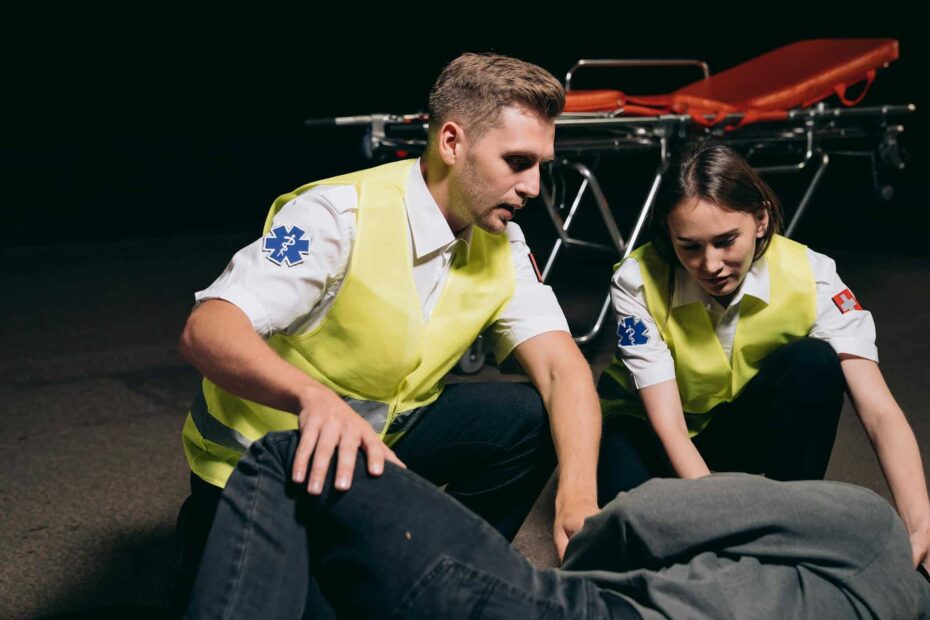Work injuries can pause your life, leaving you searching for effective recovery methods. Did you know WorkSafeBC covers physiotherapy for work-related injuries? This article guides you through managing work injuries with physiotherapy in BC, offering insights into treatment options and recovery processes.
Read on to learn how to get back on track.
Physiotherapy for Work-Related Injuries
Physiotherapy plays a crucial role in treating work-related injuries and aiding rehabilitation. Registered physiotherapists address common issues such as musculoskeletal injuries with targeted treatment plans.
Importance of Physiotherapy for Work Injuries
Physiotherapy plays a key role in the management and recovery of work injuries. It helps injured workers regain their health and function, so they can return to work faster. Through WorkSafeBC’s physiotherapy treatment program, those suffering from workplace injuries receive the care needed for rehabilitation.
This approach reduces discomfort and swelling while improving range of motion.
Registered physiotherapists offer hands-on, one-on-one care, which is crucial for treating workplace injuries effectively. They use their expertise to help manage pain and restore movement.
Physiotherapy ensures that long breaks from work due to injury are minimized by promoting quick and efficient recovery processes. With the support of specialized programs like WorkSafeBC Physiotherapy coverage, workers have access to quality physiotherapy services that aid in their rehabilitation journey back to employment.

Role of a Registered Physiotherapist
Registered physiotherapists play a crucial role in providing hands-on, one-on-one care to individuals recovering from work-related injuries. They assist in mitigating discomfort and swelling, as well as improving movement range for workers undergoing rehabilitation.
These highly trained professionals are pivotal in helping workers recover from their injuries and return to work through personalized physiotherapy treatments tailored towards each individual’s specific needs.
Physiotherapists are an essential part of the WorkSafeBC physiotherapy program, aiding individuals in regaining health and function after a workplace injury.
The role of registered physiotherapists is not only limited to treating work-related injuries but also extends to providing guidance on preventing future workplace injuries through tailored exercise programs and ergonomic assessments.
With their expertise, they significantly contribute to the overall occupational injury management process by facilitating workers’ recovery and successful return to work post-injury within Downtown Vancouver or any other location covered by the WorkSafeBC program.
Common Issues Treated Through Physiotherapy
Physiotherapy addresses common work-related issues such as back pain, repetitive strain injuries, and joint sprains. It also aids in treating musculoskeletal injuries sustained at the workplace.
Physiotherapists are skilled in managing these conditions to help individuals recover and return to work effectively, thereby reducing the impact of such issues on their occupational performance.
Musculoskeletal physiotherapy focuses on managing work-related strains, discomforts, and swelling while enhancing movement range for those recovering from workplace injuries. It plays a crucial role in minimizing the disruption caused by these common issues and facilitates a timely return to work, benefiting both the individuals involved and their workplaces.
Physiotherapy Treatment Process for Work-Related Injuries
To start physiotherapy for a work-related injury, obtain a claim number from WorkSafeBC. Attend frequent visits and follow the return-to-work process for effective recovery.
Obtaining a Claim Number
To start the physiotherapy treatment process for work-related injuries, it’s vital to obtain a claim number from WorkSafeBC. This claim number is provided once the workplace injury has been reported to WorkSafeBC and helps in accessing coverage for physiotherapy treatment.
The claim number is essential for initiating the treatment process and must be obtained promptly after sustaining a work-related injury. Physiotherapists providing occupational rehabilitation services are well-versed in working with this claim system to ensure seamless access to necessary care.
After receiving your claim number from WorkSafeBC, you can proceed with scheduling an initial assessment with a registered physiotherapist who offers coverage for work-related injuries under the WSBC program.
During this examination, the physiotherapist will evaluate your condition, develop an individualized treatment plan, and guide you through the recovery journey tailored towards your specific workplace injury.
Frequency of Visits
After obtaining a claim number, work-related injury patients typically require regular physiotherapy visits for effective recovery. These visits are tailored to individual needs and may vary depending on the severity and nature of the injury.
Physiotherapists usually recommend a specified frequency based on the treatment plan’s progress and the patient’s response. Regular sessions help individuals with work-related injuries regain strength, mobility, and functionality more effectively through targeted exercises and interventions.
The recommended frequency of visits aims to ensure steady progress towards returning to work while minimizing prolonged absences.
Physiotherapy sessions’ frequency is determined by the patient’s unique recovery needs, ensuring gradual improvement in their condition. Patients receiving physiotherapy for work-related injuries benefit from consistent care that facilitates their return to full health and function.
Return-to-Work Process
To return to work after a workplace injury, individuals must follow the physiotherapy program diligently. The frequency of visits is determined based on the severity of the injury and individual progress.
Physiotherapists play an integral role in guiding workers through exercises and activities that are tailored towards their specific work requirements. This process aids in facilitating a safe and effective return to work while minimizing the risk of re-injury.
Being proactive in engaging with physiotherapy treatment can significantly enhance the recovery process, allowing individuals to regain their health and function more efficiently.
Physiotherapy plays a pivotal role in helping individuals recover from work-related injuries and diseases. It’s designed to facilitate returning to work after a workplace injury by providing personalized care and guidance throughout the rehabilitation journey.
Conclusion
Physiotherapy plays a crucial role in managing work injuries in BC. It helps individuals recover and return to work after workplace injuries by reducing discomfort, swelling, and improving movement range.
Physiotherapists, especially those with WorkSafeBC coverage, provide tailored treatment to aid in the recovery process. With hands-on care from highly trained professionals, work-related injury management through physiotherapy is effective in restoring health and function for workers across various industries.
